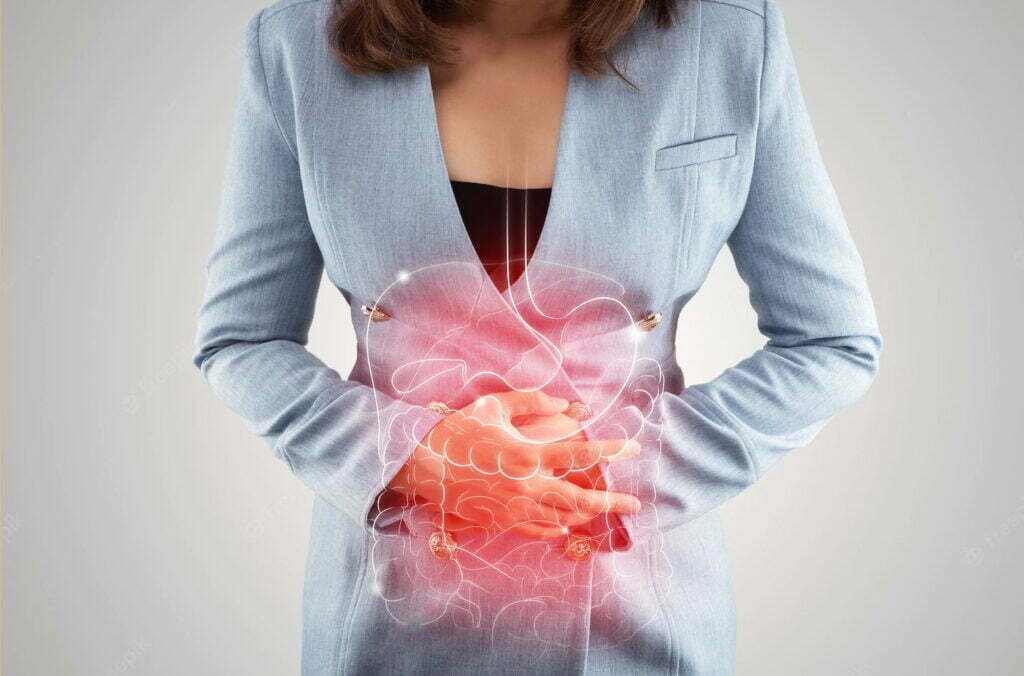Relationship between food, Digestion, and Gut Health
Digestion is the cornerstone of all health since it is the first function of the body and is linked to all other functions. Depending on the foods we choose, our state of mind and spirit, and the way our digestive system works, this system of eating, digestion, and metabolism either creates health or disease in us.To achieve total wellbeing, it is crucial to comprehend the relationship between food, digestion, and gut health.
Gut health is crucial to the overall health of the body. In addition to digestive problems, an unbalanced gut can result in a variety of physical and mental health problems. Gut health problems have increased in prevalence across the globe as a result of the deteriorating changes in our food and lifestyle practices over time.
Over 40% of individuals, according to a recent poll with over 73,000 participants from 33 countries, have gastrointestinal issues.
Among these are:
- Acid reflux
- Stomach pain
- Irritable bowel syndrome (IBS)
- Constipation
- Diarrhea
- Heartburn
- Bloating, etc.
Furthermore, today’s increasingly acidic, fatty, spicy, greasy, and processed diets have had a negative impact on our bowel patterns.
Additionally, the prevalence of major gastrointestinal diseases like colon cancer has increased due to the increasing intake of red meat and low-fiber, calorie-dense diets.
Digestion and Gut Health
Digestion and gut health are inextricably linked. Because saliva contains the carbohydrate-splitting enzyme ptyalin, which gets food ready for the stomach, digestion begins as soon as food enters the mouth. Beyond this point, in order to improve digestion, you must analyse what comprises a healthy gut. Because food is processed in the stomach from the time it is eaten until it is absorbed by the body for various purposes and biochemical processes, the gut is crucial for digestive health.
Gut health is ultimately dependent on beneficial microorganisms. According to Harvard researchers, bacteria not only aids in digestion but may also help to avoid many digestive issues and treat many prevalent diseases. Inside the digestive system, approximately 100 trillion bacteria, both beneficial and bad, dwell. They are referred to collectively as the gut microbiota.
The health of the digestive tract is considered to be the most essential function of the gut microbiota, which may also have more profound consequences on general wellbeing.
Consuming foods that support healthy gut flora may help you stay away from the symptoms of digestive diseases like indigestion, constipation, and irritable bowel syndrome.
Gut Health as per Ayurveda
While contemporary medicine has only lately recognized the importance of gut health in general health, Ayurveda has built its treatment methods on this premise for thousands of years.It emphasizes how crucial a healthy diet and digestive system are.
Ayurveda believes that all movement and function in the body are interrelated. Every disease, according to Ayurveda, is caused by an imbalance in one of the three doshas: Vata, Pitta, or Kapha. They control important gastrointestinal processes such digestion, nutrition uptake, metabolism, gut balance, excretion of waste products, etc. The colon, where the majority of gut bacteria are found, is where the Vata dosha is most prevalent.
A Vata dosha imbalance harms the gut bacteria, resulting in severe stomach discomfort, inflammation, irritable bowel syndrome, indigestion, inflammatory bowel illnesses, diarrhea/constipation, and other symptoms.
Additionally, it will have an impact on your bones, joints, nervous system, immune system, thoughts, feelings, and sleep habits.
How Ayurveda Helps Regulate Gut Health
Ayurvedic doctors recommend certain dietary and lifestyle changes to improve gut health:
Ayurveda emphasizes consuming freshly prepared foods with digestive spices to boost the gut’s digestion and evacuation functions. Furthermore, eating fresh and seasonal food provides the body with more antioxidants, nutrients, and life energy to stimulate the system than eating produce that has been stored in the refrigerator.
Nutrient absorption requires healthy gut microbes. As a result, you should avoid processed foods because they are high in carbohydrates and chemicals that kill these germs.
Consume a nutritious diet that includes probiotic-rich foods like organic yogurt, buttermilk, fermented foods like cheese, and so on.To improve your digestive health, you should increase your intake of water-soluble fiber. Whole grains, fresh fruits and veggies, and so on are all high in fiber.
Ayurvedic doctors advise eating three evenly spaced meals every day.Because the digestive fire (Agni) is hottest at noon, a small breakfast should be followed by your largest meal.This should be followed by a light meal before bed.This permits the body to effectively digest and break down food, eliminate waste efficiently, and maintain a healthy stomach.
Additionally, in order for the digestive enzymes to work on the food, you must eat slowly and chew each bite thoroughly.
To be in tune with your body, your routine must also incorporate regular exercise

